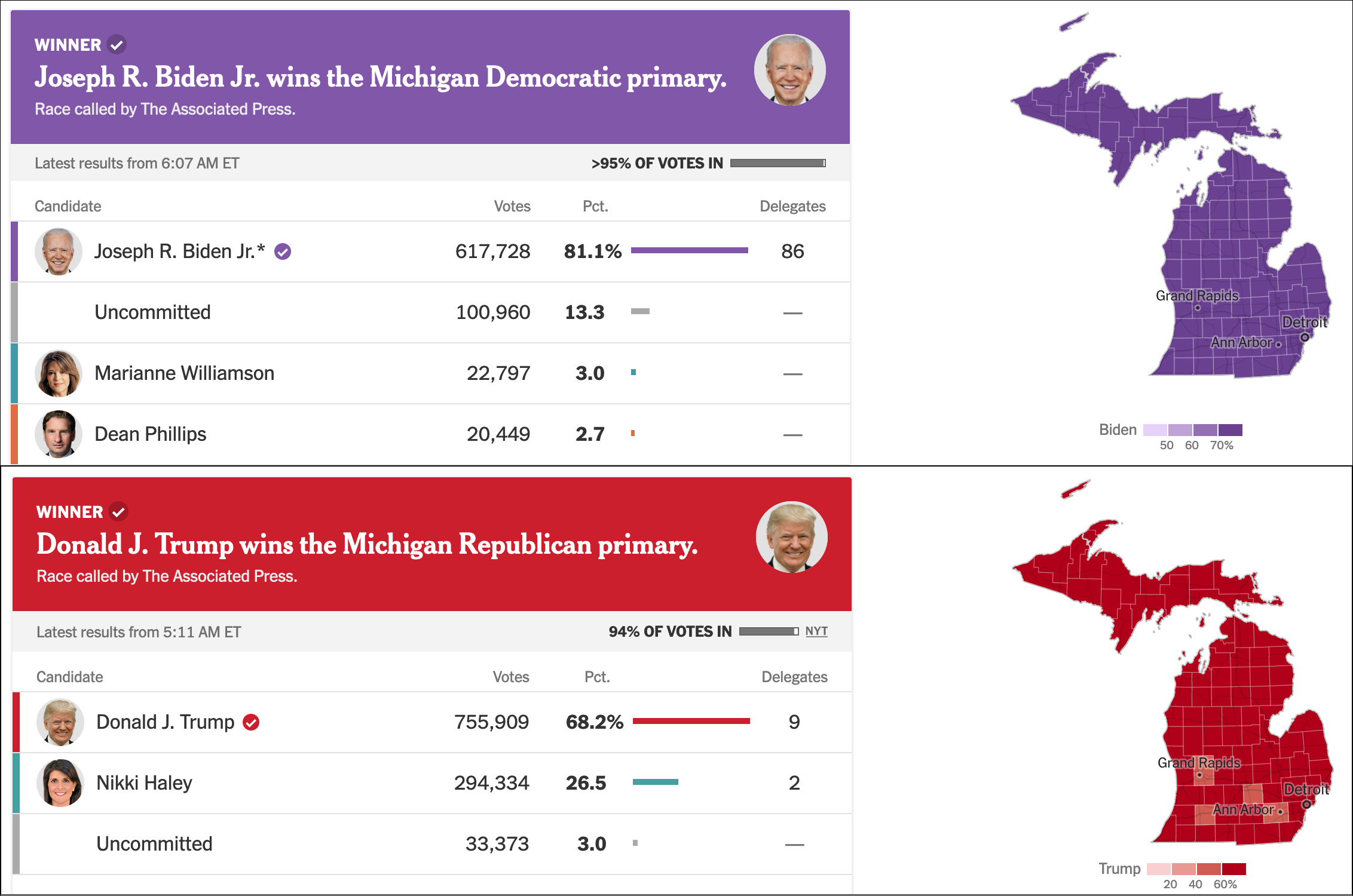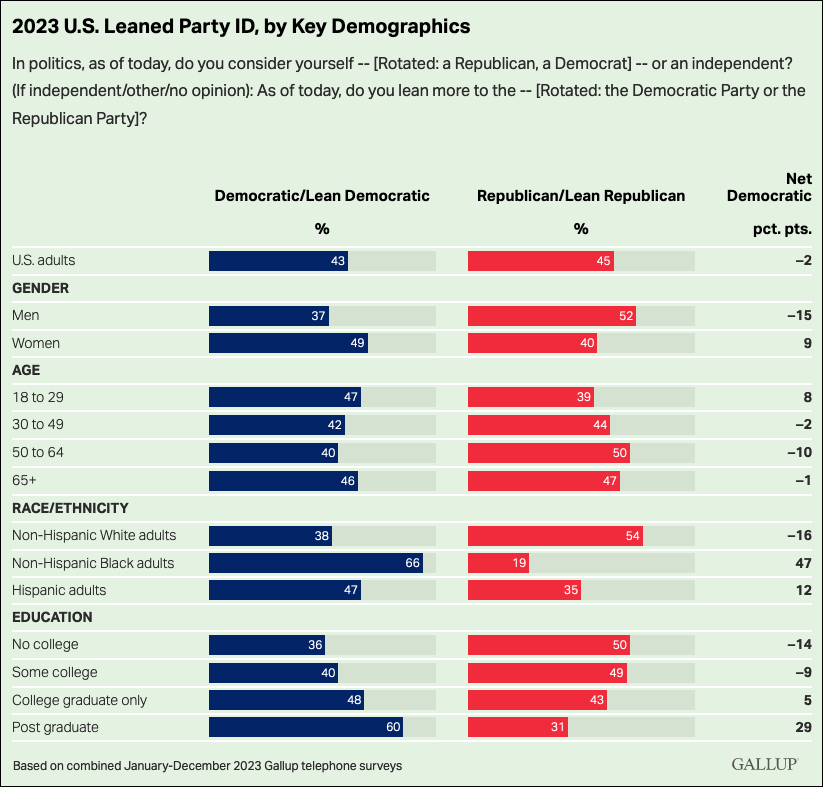By Jim Ellis — Monday, March 4, 2024
The Super Tuesday primaries are tomorrow and while the presidential nominations appear set, five states will also hold their full ballot 2024 nomination elections. Today, we look at the Alabama, Arkansas, and California primaries. Tomorrow, North Carolina and Texas.
California
The Golden State hosts the most action in the Super Tuesday state primaries. A hot open US Senate race is featured, and competition exists in as many as 20 of the state’s 52 congressional races, seven of which are open seat contests.The final Senate poll, from the University of California at Berkeley’s Institute of Government Studies for the Los Angeles Times (Feb. 22-27; 6,536 registered California voters; 3,304 of whom have already mailed their ballots; online) contains a surprise.
For the first time since this open Senate race began, Rep. Adam Schiff (D-Burbank) has lost his first place spot. Republican former baseball star Steve Garvey has captured the lead largely because Schiff has been spending heavily to label him as too conservative in an attempt to unify Republicans and block Rep. Katie Porter (D-Irvine) from qualifying for the general election.
The ballot test finds Garvey posting 27 percent support with Rep. Schiff close behind with 25 percent. Porter would be eliminated if this poll’s findings are correct. She attracts 19 percent support, while Rep. Barbara Lee (D-Oakland) drops to eight percent preference. Garvey and Schiff would then advance into the general election. An inter-party general election heavily favors Democrats.
In the top two all-party jungle primary House races, several could be headed for general elections featuring members of the same political party.
The districts potentially producing double-Democratic finalists are the 12th (open; Rep. Lee running for Senate),16th (open; Rep. Anna Eshoo-D retiring), 25th (Rep. Raul Ruiz-D being challenged), 26th (Rep. Julia Brownley vs. Councilman Chris Anstead), 29th (open; Rep. Tony Cardenas-D retiring), 30th (open; Rep. Schiff running for Senate), 31st (open; Rep. Grace Napolitano-D retiring), and 34th (Rep. Jimmy Gomez-D again being challenged).
The vacant 20th District (Rep. Kevin McCarthy-R resigned) could potentially produce a double-Republican general election.
Competitive inter-party races already look set in the 3rd (Rep. Kevin Kiley-R vs. Jessica Morse-D), 9th (Rep. Josh Harder-D vs. Stockton Mayor Kevin Lincoln-R), 13th (Rep. John Duarte-R vs. former Assemblyman Adam Gray-D), 21st (Rep. Jim Costa-D vs. Michael Maher-R), 22nd (Rep. David Valadao-R vs. ex-Assemblyman Rudy Salas-D), 27th (Rep. Mike Garcia-R vs. George Whitesides-D), and 41st (Rep. Ken Calvert-R vs. Will Rollins-D).
In several other competitive seats, the general election slate is uncertain heading into tomorrow’s primary, though all mentioned incumbents will claim the first general election ballot slot. Those are: Districts 40 (Rep. Young Kim-R), 45 (Rep. Michelle Steel-R), 47 (open; Rep. Katie Porter-D running for Senate), and 49 (Rep. Mike Levin-D).
Though the California jungle primary can’t elect any candidate outright, tomorrow’s voting will provide us with a significant number of political answers.
Alabama
In adherence to the US Supreme Court’s ruling on the Alabama racial gerrymandering case, the state’s congressional map has been redrawn. Tomorrow’s focus will be on two major House races, the Republican pairing between Reps. Jerry Carl (R-Mobile) and Barry Moore (R-Enterprise) in a newly crafted 1st District that stretches from Mississippi to Georgia along Alabama’s Florida border, and an open 2nd CD from Montgomery to Mobile that is designed to elect an African American candidate.
Even though Alabama is a runoff state, the Carl/Moore contest will be decided tomorrow since they are the only two candidates on the ballot. Therefore, the winner will have majority support and become the prohibitive favorite for the general election. Carl currently represents 59 percent of the new district, and Moore, 41 percent. Both have been attacking the other as weak on the southern border.
The most recent poll, from Auburn University at Montgomery with the Survey Research Center at the University of Georgia (Feb. 27; 1,909 likely AL-1 voters; text to web) found a ballot test result that favors Rep. Carl, 43-35 percent, but suggests the final outcome will yield a close result.
In the 2nd CD, we can expect the primary vote to produce runoff elections for both parties. A total of 11 Democrats and seven Republicans are competing for their respective nominations. The field includes two state senators, four state representatives, including the House Minority Leader and Minority Whip, and one local official. The eventual Democratic nominee becomes a clear favorite in the general election.
Arkansas
The presidential contest is the only statewide race on the Arkansas ballot and all four of the state’s US House members are seeking another term. Tomorrow’s only semi-competitive battle occurs in the northwest Arkansas 3rd Congressional District where seven-term US Rep. Steve Womack (R-Rogers) faces state Sen. Clint Penzo (R-Springdale).
The challenger had raised less than $94,000 and had $65,000 cash-on-hand through the Feb. 14 pre-primary filing. This suggests little activity on his part, and we can expect a big Womack victory tomorrow night. No change is expected in the Arkansas delegation for the next Congress.






